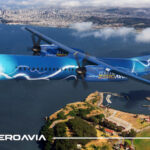
(TAN): Delta and Airbus will collaborate on research to accelerate the development of a hydrogen-powered aircraft and the ecosystem it requires, the airline said in a statement.
Hydrogen power has great potential to speed air travel toward net zero carbon emissions, a future that could be accelerated thanks to a new agreement between Delta and Airbus. As part of its Flight to Net Zero plan to scale and advance sustainable technologies, Delta has signed a Memorandum of Understanding to become the first US-based airline to collaborate with Airbus on the research and development of hydrogen-powered aircraft and the ecosystem required to make the transition.
Bolstering its commitment to a future of net-zero aviation, Delta is joining three key coalitions of investors, suppliers, competitors and industry champions to drive real impact for the planet.
[ALSO READ: Emirates Skywards and ICICI Bank launch new co-branded credit card in India]
“To pull the future of sustainable aviation forward, we need to accelerate the development and commercialization of potentially disruptive technologies,” said Pam Fletcher, Delta’s Chief Sustainability Officer. “Hydrogen fuel is an exciting concept that has the potential to redefine the status quo. These tangible steps lay the groundwork for the next generation of aviation.”
Under the agreement, Delta will provide the expertise of its people to identify fleet and network expectations, and the operational and infrastructure requirements needed to develop commercial aircrafts powered by hydrogen fuel. The areas of focus will be:
- Aircraft Concept: Exploring the technical and economic viability of hydrogen-fueled aircraft, identifying the pathway for introduction into Delta’s fleet and operations, as well as the aircraft’s potential performance in Delta’s fleet. That includes identifying challenges such as flight range limits, refueling time and airport compatibility.
- Aviation Ecosystem: Assessing the infrastructure that will be needed to develop green hydrogen, bring it to scale and implement at airports nationwide, as well as analyzing regulation and costs, to identify a clear path for progress ahead.
- Coalition Building: Advocating for a decarbonized future in aviation, including pathways to hydrogen production, with key industry stakeholders.
[ALSO READ: SWISS ups its gastronomy game on long-haul services from Switzerland]
“To decarbonize aviation, we need to develop the right technology bricks and a dynamic hydrogen eco-system,” said Julie Kitcher, Airbus E.V.P. Communications & Corporate Affairs. “Through close collaboration with key partners, such as Delta, we will integrate our customers’ expertise and specific needs to ensure our zero-emission aircraft will be a game-changer for sustainable aerospace.”
This programme builds on Delta’s ongoing Flight to Net Zero efforts through coalitions that aim to bring to life the next chapter of aviation. Reaching net zero requires a holistic approach to decarbonization and collaboration across all corners of the industry.
This partnership significantly increases Delta’s access to sustainable aviation fuel while expanding the alternative fuel market. Sustainable aviation fuel is produced from bio feedstocks that can reduce greenhouse gas lifecycle emissions significantly compared to conventional jet fuel.
The announcement builds on Delta’s recent investment through its pension plans in TPG Rise Climate fund, which focuses on supporting climate solutions at scale. Delta has also joined the First Movers Coalition, a public-private partnership and platform designed to accelerate and scale the development of breakthrough climate technologies.




